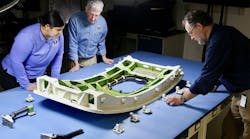The casting in a New Jersey company’s 8 ft. diameter rotary steam dryer, a mainstay of its production process, was leaking. Steam penetrating the wall of the casting contaminated the company’s product, causing severe quality problems that made the product unusable. The company could not afford lengthy downtime, and replacement of the dryer with a new one would have been costly and taken several months.
What could they do?
Fortunately, an effective impregnation process for large castings was available to fix the multiple small leaks that were causing such a big problem. In this, and many similar cases, a large-casting impregnation process can fix potentially disastrous problems in hours or days, rather than the time it takes to replace or reface a mold or other large casting. In addition, impregnation avoids the longer and often devastatingly costly process line downtime that a company encounters when a piece of key equipment goes down.
Porosity Unavoidable in Casting Process
For large machines, castings play an important role as bases holding lubricants, as pumps holding liquids, and as compressor bodies holding gases. Often, these castings are very large, weighing several thousand pounds. They are expensive and complex, they have critical dimensions and tolerances, and replacements require long lead times. In these castings, as well as in smaller diecast parts, unavoidable porosity can cause leaks and make the casting unusable for its intended purpose.
It is the nature of the casting process, which depends on solidification of metal into a final shape, for molten material to shrink slightly, creating fissures, voids, and porosity. Such challenges are typical and generally occur in large castings, as in the case of the N.J. company’s steam dryer. For the most part, porosity has no practical effect on casting strength and integrity, and since the majority of large castings are used in structural applications, porosity usually does not present a problem.
In other applications, where the castings must contain liquids or gases, porosity prevents the casting from doing its job. Leaks following porosity pathways from surface to surface prevent the casting from retaining the fluid or gas.
Analysis of Leaks and Solutions
Initially, the N.J. company personnel didn’t know where the leak was or if there were multiple leaks. Their analysis indicated that the leaking was from several small areas where the casting’s design caused porosity and some very small micro fissures around welded joints.
Often, various solutions are considered for such problems. For example, in exploring the alternatives familiar to them, the company considered welding, but concluded that welding was too localized a solution. In addition, welding might cause further problems with the smooth surface of the dryer. Further, weld repair is known to cause porosity leakage along the weld transition zone, a problem similar to that the company already was encountering. Metal stitching, another repair operation used on large castings with cracks, presented similar difficulties.
The company also considered coating alternatives. However, the inability to identify the specific area that was leaking, concerns about thermal transfer, and the thermal shock inherent in the process suggested that coating adhesion problems could further contaminate products while not fully stopping the leaks.
The ideal solution was one that would remain entirely within the walls of the steam channels, didn’t impact the operational surface, was permanent, and could be done in a short period of time without dismantling the machine.
Further analysis confirmed that the leaking was due to porosity that had opened through the continuing physical and thermal shock , which was normal in the operation of the equipment. Likewise, the analysis showed that normal impregnation processing was the best solution to seal the leaks and return the equipment to production.
The Impregnation Solution
The impregnation process is well-known and often is immediately considered when dealing with porosity problems in small diecastings. The process for small castings generally takes place in an autoclave in which a vacuum is pulled to remove the air present in the porosity. Then the cast parts are exposed to a liquid resin. The resin enters the porous areas with the assistance of pressurization that occurs when the vacuum is removed or, in more sophisticated systems, with the assistance of a factory compressed air supply. After impregnation, the parts are washed, then cured in a heat bath. The size of the impregnation equipment generally limits the size of the casting that can be treated.
For large castings, because of their size and location, the casting itself becomes the impregnation vessel. In this instance, the casting is cleaned and thoroughly dried, all the openings are plugged, and resin is introduced into the casting. Hydraulic pressure then is applied by an external means, which results in the resin penetrating the porosity from the interior of the casting.
Pressure used in these cases is generally 150 percent of the operating pressure of the casting, and impregnation pressures of 10,000 psi are common. The resin follows the same leak path as the liquid or gas that originally was leaking. After a predetermined time, the pressure is relieved, the resin is removed, and the internal passageways are flushed clean. The casting is then heated so the resin solidifies within the pores, sealing all the leaks.
Second Impregnation Leak Test
Generally, a second treatment also is recommended for large castings. This ensures penetration and sealing of any porosity that may have been unusually small or too oddly shaped to accept the resin during the first impregnation.
Experience has shown that castings of this size contain both gross and micro porosity. Taking the path of least resistance, the resin fills and flows out of the casting through the gross porosity prior to achieving pressure. The second impregnation ensures that smaller pores are penetrated and maximum pressure can be obtained without leaks.
An added benefit of the second impregnation is that it is also a leak test, providing added assurance that the part will operate leak-free.
No Size or Weight Limitations
As a practical matter, there is no limitation to the size or weight of castings that can be impregnated in this way. Indeed, routine experience at IMPCO has shown virtually 100 percent success in impregnating heat exchangers over 20 ft. long and compressor cylinders weighing more than 10,000 lbs.
There is no limitation on the wall thicknesses of the casting. For instance, heavy extruder parts, which see operational pressures of thousands of pounds, are routinely impregnated for porosity leakage. These parts have very thick walls, and sometimes have cast inserts. Impregnation not only seals the porosity, but also seals the inserts into the casting as well, preventing further leaks along a well-recognized potential leak path at the boundary of dissimilar materials.
Permanent Seal
For castings treated in this manner, the impregnation process is permanent. Because the resins are thermoset and react only with heat, they do not revert to the liquid state and flow out of previously sealed porous areas. They also do not prematurely set up and plug passages. These thermoset resins have excellent heat and chemical resistance, and their operational test pressures are equivalent to operating pressures and temperatures of castings.
In addition, the internal impregnation methods used are proven and widely accepted because they meet the military standard for impregnation, MIL-STD-276A, and the materials specification, MIL-STD-I-17563C. Because MIL-STD-276A describes the general procedure that should be used, the process is easily documented for internal quality records.
Wide Range of Applications
This method of impregnation can be applied to a range of large ferrous and nonferrous castings. Machine base castings are an example.
Another example would be the molds used to make thermoset plastic parts, such as dashboards for autos or fender inserts. These molds typically weigh more than 3,000 lbs. Failures are typified by a leak from the cooling channels of the mold to the surface. Porosity in molds generally is caused by multiple thermal and physical shock cycles of the molding process. Impregnation of these molds and similar pieces is very successful.
Although porosity problems in molds can appear any time, they are more prevalent at the end of a mold’s design life — which may range from thousands to millions of impressions. An impregnation-repaired mold will allow a company to continue a production run. In some cases, new leakage may reappear, and the process can be repeated.
As with impregnation of cast iron machine bases, experience indicates that impregnation is nearly 100 percent successful and will last the life of the casting. Generally, the leaking areas are near the chaplets inserted into the mold to hold it together or in machine passageways for lubricants or cooling media. In 15 years of experience performing large-casting machine base impregnations, no subsequent in-field leak has been reported to us.
Effective Solution
For most applications, internal impregnation of large castings is feasible and highly successful. Sometimes, the process may be done in the field, further saving time and expense associated with the removal of the piece. Carefully done, impregnation is a permanent solution that can save a company thousands of dollars by avoiding downtime and extending equipment life for many years.
About IMPCO Inc.
IMPCO Incorporated, East Providence, RI, is a full-service impregnation technology company, providing impregnation materials, equipment, and services to manufacturers throughout the United States and the world.
From the United States to the Peoples Republic of China, IMPCO has installed equipment, furnished materials, and provided services for the efficient sealing of porous parts. With quick and effective sealing of ferrous and nonferrous metal castings and assemblies, as well as plastic parts, IMPCO has saved its customers thousands of dollars by enabling them to put leak-proof parts into production. The company also provides job shop services.
Established in 1950, the company has licensed or sold technology to customers in the U.S. and overseas. In 1987, IMPCO established a subsidiary in Southern California. IMTECH of California, Incorporated, provides impregnation, parts cleaning, and leak-testing job shop services in Santa Fe Springs.
IMPCO offers all necessary equipment and technologies to establish impregnation facilities for foundries and other companies’ in-house finishing operations. The company supplies customers with appropriate impregnation materials that include polyester resins, sodium silicate, and epoxies, and provides training and support. The company’s impregnation processes and materials are engineered for minimal environmental impact and maximum safety in the workplace.
With a standard line of impregnation equipment that can be easily modified to fit unique customer requirements, the company’s process versatility gives the best results for customers’ production requirements. IMPCO also provides continuing technical assistance, either directly through on-site presence or through Web-based technologies that allow the company to monitor production parameters.
For customers who do not want to perform their own impregnation and cleaning operations, IMPCO offers job shop services for both small and large parts and also performs impregnation of large castings and molds at customer sites. The company has considerable experience in impregnating a wide range of part sizes, from components measured in millimeters to parts over 20 ft. long and several tons in weight. IMPCO’s specially formulated materials show excellent temperature and pressure resistance, and will not affect machined surfaces or cause discoloration.
Proven impregnation applications include those for electronic components, powdered metal parts, hydraulic systems, valves, compressors, glass and ceramic parts, engines, truck and railway brake parts, automotive carburetors, fuel injection systems, water and fuel pumps, gas and steam fittings, and transmission cases. Impregnation of large castings include machine bases for various production lines and molds used to make thermoset plastic parts.
For further information, contact IMPCO, Tel 401-521-2490; Fax 401-521-5690.
[email protected]
Or, visit www.impco-inc.com








